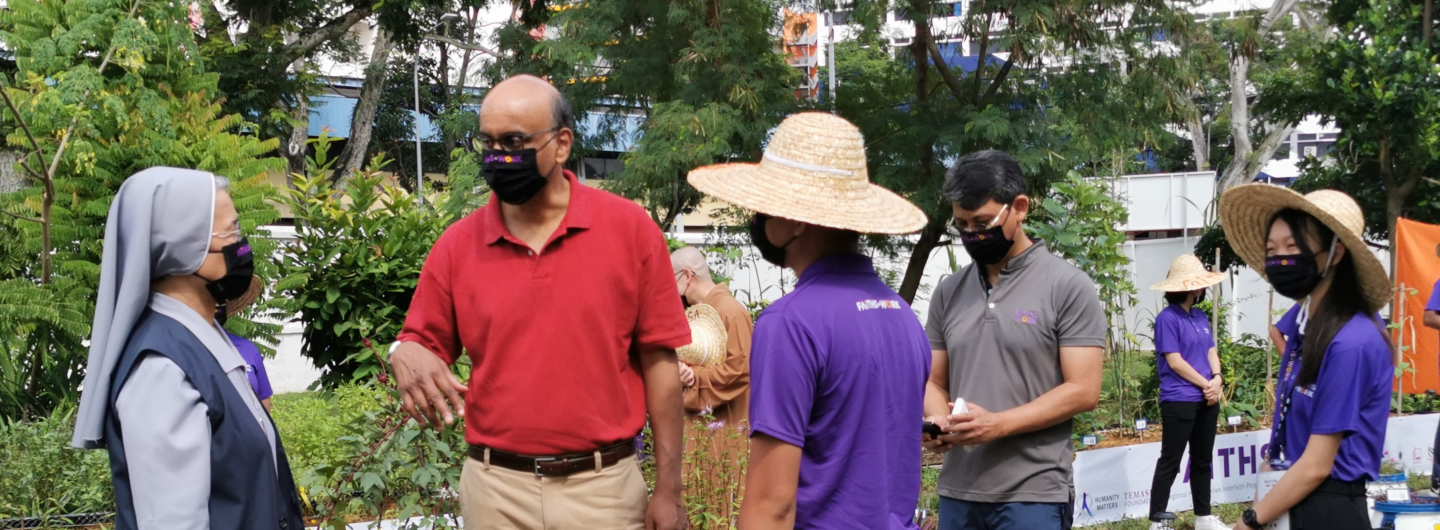Address by Senior Minister and Coordinating Minister for Social Policies Tharman Shanmugaratnam at the Official Launch of Faiths@Work Demo Farm at Canossian School, 10 September 2021.
Ambassador Ong Keng Yong,
Mr Benedict Cheong,
Sister Theresa Seow,
Venerable Shi You Wei,
Ladies and gentlemen
Thank you to Humanity Matters for inviting me to the official launch of the Faiths@Work Demo Farm. I am very happy to be part of this very meaningful initiative. It is a real demonstration of the impact that can be achieved when people come together for a common purpose and the common good. It is very much an exemplification of the official slogan of Humanity Matters – Collective Compassion in Motion.
I see three key dimensions in which this project is very meaningful.
First, the Demo Farm concerns a real need, in our local community and for communities in our region. The Farm demonstrates how different types of climate-resilient crops can be grown in our region, and aims to spread best practices in farming these crops using simple and appropriate farming methods.
The crops were carefully selected by Humanity Matters, with guidance from NParks. A key consideration was in the selection of climate-resilient crops that tolerate drought and extreme rainfall, so they can withstand the extreme weather events that climate change is bringing, and which will impact the region.
It is in fact a very interesting mix of crops that NParks and Humanity Matters have put into the farm: staples like tapioca, sweet potato, and yam; native plants like kangkong and Asian Pennywort (also known as Gotu Kula) which have high nutritional and health value; medicinal plants such as the Sabah Snake Grass, which is used to treat insect and snake bites, skin rashes, diabetes and gout, and the Singapore Rhododendron (or commonly Sendudok), which is used in Po Chai pills to treat gastrointestinal discomfort; nitrogen-fixing plants like sword and winged beans that add nitrogen into poor soil; and crops that are culturally significant such as the ulam raja and butterfly pea, which are used in our regional foods and kuehs.
The regional participants of Faiths@Work this year spent the last few days under rain and shine to put the farm together, and learn about the propagation methods, harvesting and storage of these crops. I spoke to some of them earlier and I could see how they are quite inspired and want to see how they can apply their knowledge and experience back in their own communities.
But there will also be a more lasting legacy to the Demo Farm. The participants have also put together an e-FarmBook on the crops’ characteristics, health and nutritional benefits, methods of propagation and even recipes. This e-FarmBook will be circulated to the ASEAN Coordinating Centre for Humanitarian Assistance and other NGOs for disaster management, relief and sustainable development, so the know-how can continue to be shared widely among communities in the region.
The students at Canossian and volunteers from Di Zang Lin temple are going to maintain this Demo Farm on an on-going basis, and open up the Farm to community groups and visitors once COVID-19 stabilises. I know they also intend to share the harvests of the Farm with vulnerable residents in the neighbourhood, who will be the beneficiaries of these continuing efforts.
Second, the Demo Farm makes a meaningful contribution in building sustainability into our everyday lives. The Farm itself is part of our broader sustainability efforts, to grow community gardening and urban farming in Singapore. There are also specific sustainability initiatives that have been implemented at the Farm. Composting is carried out, which has many benefits, including carbon sequestration, reduction of waste disposal and improvement of plant and soil health. The Farm has also used recycled chemical drums as planter beds for the crops, which have been individually painted by the Faiths@Work participants. This is a good example of upcycling to reduce waste.
Even the lights that will illuminate the Farm’s paths at night will run on solar energy.
Third, the real intangible value of this project is in how Humanity Matters and its partners have brought people together – across faiths, and from around the region. I am also glad that organisations like Humanity Matters are looking beyond our shores to see how we can contribute to efforts around our region to improve lives, learn from others in the region, and also enhance people-to-people understanding.
I should add that this is just the latest in a series of very concrete and impactful initiatives that Humanity Matters has been initiating over the past few years. It is the second joint community service project under the Faiths@Work initiative, following from its successful Community Clean Water project in Tondo, Manila in 2019. There are also the Humanitarian Affairs, Sustainability & Servant Leadership (HASL) workshops that our ASEAN friends have just gone through, which train young leaders in humanitarian affairs, disaster management and sustainable development. Humanity Matters has also activated and deployed teams for typhoons, volcanic eruptions, floods and sustainable development projects, as well as in the COVID-19 relief support, in ASEAN countries, China, India and Sri Lanka. I hope that the participants in this year’s Faiths@Work will be active members of the network, and continue to be involved in the efforts by Humanity Matters in the region and beyond.
Finally, my congratulations to all our friends from the region, and to Humanity Matters for the Faiths@Work programme and the Demo Farm. I would also like to thank Temasek Foundation, which has been a strong and continuing supporter of this effort, as well as the Canossian School and Di Zang Lin temple for being part of this very good initiative. It is community action like this that develop harmonious ties across religions or nations. Such ties are not forged by nice platitudes, but in the doing and shared experiences.
* * * * *
Explore recent content
Explore related topics

